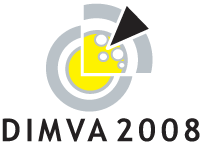Fifth Conference on
Detection of Intrusions and Malware & Vulnerability Assessment

July 10-11th, 2008
Paris, France
DIMVA 2008: Program
| 10th July (Thursday) |
|
|
|
|
 |
|
 |
| 9:15 |
Session: Malware detection and prevention (I)
(chair: Ludovic Me) |
|
Dynamic Binary Instrumentation-based Framework
for Malware (Virus) Defense
Najwa Aaraj, Anand Raghunathan, Niraj K. Jha |
|
 |
 |
 |
Embedded Malware Detection using Markov n-grams
M. Zubair Shafiq, Syed Ali Khayam, Muddassar Farooq |
|
 |
 |
 |
Learning and Classification of Malware Behavior
Konrad Rieck, Thorsten Holz, Carsten Willems, Patrick DŘssel, Pavel Laskov |
|
 |
 |
 |
|
|
| 11:15 |
Session: Attack prevention (chair: John McHugh) |
|
Data Space Randomization (DSR)
Sandeep Bhatkar, R. Sekar |
|
 |
 |
 |
XSS-GUARD: Precise Dynamic Prevention of Cross-Site Scripting Attacks
Prithvi Bisht, V.N. Venkatakrishnan |
|
 |
 |
 |
VeriKey: A Dynamic Certificate Verification System for Public Key Exchanges
Brett Stone-Gross, David Sigal, Rob Cohn, John Morse, Kevin Almeroth, Christopher Kruegel |
|
|
 |
 |
|
|
| 14:00 |
Keynote talk: "The Future of Network Security Monitoring",
Richard Bejtlich, Director of Incident Response, General Electric |
|
Abstract: Richard Bejtlich explored Network Security
Monitoring (NSM) in his first book, the Tao of Network Security
Monitoring: Beyond Intrusion Detection, in 2004. Richard based his
discussion on a historical foundation reaching back to the early
1990s. In this talk, Richard will briefly explore that history and
provide context for current NSM implementations. Richard will then
look forward to see how NSM fits in a world where the cloud is the
computer, most endpoints are terminals (again), and the network is one
of many simultaneous connections not under control of the IT
department.
Speaker bio:Richard Bejtlich is Director of Incident Response
for General Electric. Prior to joining GE, Richard operated
TaoSecurity LLC as an independent consultant, protected national
security interests for ManTech Corporation's Computer Forensics and
Intrusion Analysis division, investigated intrusions as part of
Foundstone's incident response team, and monitored client networks for
Ball Corporation. Richard began his digital security career as a
military intelligence officer at the Air Force Computer Emergency
Response Team (AFCERT), Air Force Information Warfare Center (AFIWC),
and Air Intelligence Agency (AIA). Richard is a graduate of Harvard
University and the United States Air Force Academy. He wrote "The Tao
of Network Security Monitoring" and "Extrusion Detection," and
co-authored "Real Digital Forensics." He also writes for his blog
(taosecurity.blogspot.com) |
|
 |
|
 |
|
|
| 15:45 |
Session: Attack techniques and Vulnerability assessment (chair: Ulrich Flegel) |
|
On Race Vulnerabilities in Web Applications
Roberto Paleari, Davide Marrone, Danilo Bruschi, Mattia Monga |
|
 |
 |
 |
On the Limits of Information Flow Techniques for Malware Analysis and Containment
Lorenzo Cavallaro, Prateek Saxena, R. Sekar |
|
 |
 |
 |
| 11th July (Friday) |
|
|
| 09:00 |
Keynote talk: "From Virtual Machines to Virtual Infrastructure: How Virtualization is Reshaping the Enterprise and What this Means for Security",
Tal Garfinkel, VMware/Stanford University |
|
Abstract:The move to virtual machine based computing platforms is perhaps the most significant change in how enterprise computing systems have been built in the past decade. In this talk Tal Garfinkel will look at how virtualization is reshaping the way that enterprise data centers are built and managed. He will then share some of the challenges and surprises encountered along the way. Finally, he will explore the unique opportunities these changes are offering to rethink how we design host and network security.
Speaker bio:Tal Garfinkel is a senior scientist in the advanced development group at VMware where he splits his time between developing new technologies and setting the direction for the core platform security architecture. He is currently completing a PhD at Stanford University and holds a bachelor's degree in computer science from the University of California, Berkeley. |
|
|
|
 |
|
|
| 10:45 |
Session: Malware detection and prevention (II)
(chair: Sven Dietrich) |
|
Expanding Malware Defense by Securing Software Installations
Weiqing Sun, R. Sekar, Zhenkai Liang, V.N. Venkatakrishnan |
|
 |
 |
 |
FluXOR: detecting and monitoring fast-flux service networks
Emanuele Passerini, Roberto Paleari, Lorenzo Martignoni, Danilo Bruschi |
|
 |
 |
 |
Traffic Aggregation for Malware Detection
Ting-Fang Yen, Michael Reiter |
|
 |
 |
 |
|
|
| 13:45 |
Rump session (chair: Sven Dietrich) |
|
|
|
| 15:15 |
Session: Intrusion detection and Activity correlation (chair: Bernhard Haemmerli) |
|
The Contact Surface: A Technique for Exploring Internet Scale Emergent Behaviors
Carrie Gates, John McHugh |
|
 |
 |
|
The Quest for Multi-headed Worms
Van-Hau Pham, Marc Dacier, Guillaume Urvoy-Keller, Taoufik En-Najjary |
|
 |
 |
|
A Tool for Offline and Live Testing of Evasion Resilience in Network Intrusion Detection Systems
Leo Juan, Christian Kreibich, Chih-Hung Lin, Vern Paxson |
|
 |
 |
|
|
|
|
|
 |
Organized by France TÚlÚcom
- Orange
Labs
|





















